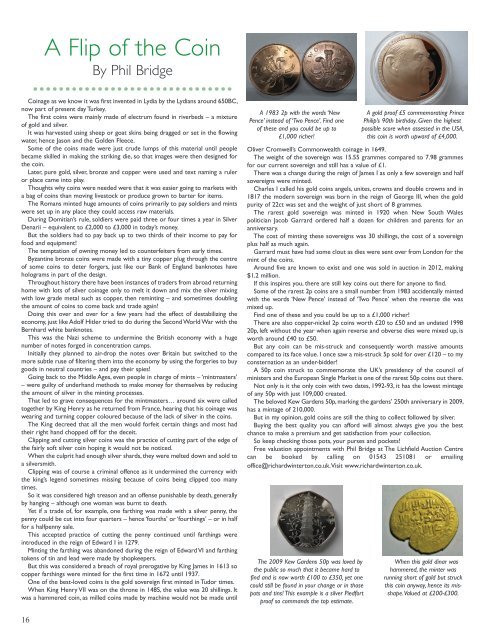Citylife in Lichfield January 2022
It's the New Year and let's hope that 2022 is a better year for all of us! Our January edition magazine is full of our usual mix of local news, history features, competitions, recipes and What's On events as well as some ideas for getting yourself in shape for 2022! We hope you enjoy reading our magazine - and a Happy New Year from everyone at Citylife Magazines!
It's the New Year and let's hope that 2022 is a better year for all of us! Our January edition magazine is full of our usual mix of local news, history features, competitions, recipes and What's On events as well as some ideas for getting yourself in shape for 2022! We hope you enjoy reading our magazine - and a Happy New Year from everyone at Citylife Magazines!
Create successful ePaper yourself
Turn your PDF publications into a flip-book with our unique Google optimized e-Paper software.
A Flip of the Co<strong>in</strong><br />
By Phil Bridge<br />
...............................<br />
Co<strong>in</strong>age as we know it was first <strong>in</strong>vented <strong>in</strong> Lydia by the Lydians around 650BC,<br />
now part of present day Turkey.<br />
The first co<strong>in</strong>s were ma<strong>in</strong>ly made of electrum found <strong>in</strong> riverbeds – a mixture<br />
of gold and silver.<br />
It was harvested us<strong>in</strong>g sheep or goat sk<strong>in</strong>s be<strong>in</strong>g dragged or set <strong>in</strong> the flow<strong>in</strong>g<br />
water, hence Jason and the Golden Fleece.<br />
Some of the co<strong>in</strong>s made were just crude lumps of this material until people<br />
became skilled <strong>in</strong> mak<strong>in</strong>g the strik<strong>in</strong>g die, so that images were then designed for<br />
the co<strong>in</strong>.<br />
Later, pure gold, silver, bronze and copper were used and text nam<strong>in</strong>g a ruler<br />
or place came <strong>in</strong>to play.<br />
Thoughts why co<strong>in</strong>s were needed were that it was easier go<strong>in</strong>g to markets with<br />
a bag of co<strong>in</strong>s than mov<strong>in</strong>g livestock or produce grown to barter for items.<br />
The Romans m<strong>in</strong>ted huge amounts of co<strong>in</strong>s primarily to pay soldiers and m<strong>in</strong>ts<br />
were set up <strong>in</strong> any place they could access raw materials.<br />
Dur<strong>in</strong>g Domitian’s rule, soldiers were paid three or four times a year <strong>in</strong> Silver<br />
Denarii – equivalent to £2,000 to £3,000 <strong>in</strong> today’s money.<br />
But the soldiers had to pay back up to two thirds of their <strong>in</strong>come to pay for<br />
food and equipment!<br />
The temptation of own<strong>in</strong>g money led to counterfeiters from early times.<br />
Byzant<strong>in</strong>e bronze co<strong>in</strong>s were made with a t<strong>in</strong>y copper plug through the centre<br />
of some co<strong>in</strong>s to deter forgers, just like our Bank of England banknotes have<br />
holograms <strong>in</strong> part of the design.<br />
Throughout history there have been <strong>in</strong>stances of traders from abroad return<strong>in</strong>g<br />
home with lots of silver co<strong>in</strong>age only to melt it down and mix the silver mix<strong>in</strong>g<br />
with low grade metal such as copper, then rem<strong>in</strong>t<strong>in</strong>g – and sometimes doubl<strong>in</strong>g<br />
the amount of co<strong>in</strong>s to come back and trade aga<strong>in</strong>!<br />
Do<strong>in</strong>g this over and over for a few years had the effect of destabiliz<strong>in</strong>g the<br />
economy, just like Adolf Hitler tried to do dur<strong>in</strong>g the Second World War with the<br />
Bernhard white banknotes.<br />
This was the Nazi scheme to underm<strong>in</strong>e the British economy with a huge<br />
number of notes forged <strong>in</strong> concentration camps.<br />
Initially they planned to air-drop the notes over Brita<strong>in</strong> but switched to the<br />
more subtle ruse of filter<strong>in</strong>g them <strong>in</strong>to the economy by us<strong>in</strong>g the forgeries to buy<br />
goods <strong>in</strong> neutral countries – and pay their spies!<br />
Go<strong>in</strong>g back to the Middle Ages, even people <strong>in</strong> charge of m<strong>in</strong>ts – ‘m<strong>in</strong>tmasters’<br />
– were guilty of underhand methods to make money for themselves by reduc<strong>in</strong>g<br />
the amount of silver <strong>in</strong> the m<strong>in</strong>t<strong>in</strong>g processes.<br />
That led to grave consequences for the m<strong>in</strong>tmasters… around six were called<br />
together by K<strong>in</strong>g Henry as he returned from France, hear<strong>in</strong>g that his co<strong>in</strong>age was<br />
wear<strong>in</strong>g and turn<strong>in</strong>g copper coloured because of the lack of silver <strong>in</strong> the co<strong>in</strong>s.<br />
The K<strong>in</strong>g decreed that all the men would forfeit certa<strong>in</strong> th<strong>in</strong>gs and most had<br />
their right hand chopped off for the deceit.<br />
Clipp<strong>in</strong>g and cutt<strong>in</strong>g silver co<strong>in</strong>s was the practice of cutt<strong>in</strong>g part of the edge of<br />
the fairly soft silver co<strong>in</strong> hop<strong>in</strong>g it would not be noticed.<br />
When the culprit had enough silver shards, they were melted down and sold to<br />
a silversmith.<br />
Clipp<strong>in</strong>g was of course a crim<strong>in</strong>al offence as it underm<strong>in</strong>ed the currency with<br />
the k<strong>in</strong>g’s legend sometimes miss<strong>in</strong>g because of co<strong>in</strong>s be<strong>in</strong>g clipped too many<br />
times.<br />
So it was considered high treason and an offense punishable by death, generally<br />
by hang<strong>in</strong>g – although one woman was burnt to death.<br />
Yet if a trade of, for example, one farth<strong>in</strong>g was made with a silver penny, the<br />
penny could be cut <strong>in</strong>to four quarters – hence ‘fourths’ or ‘fourth<strong>in</strong>gs’ – or <strong>in</strong> half<br />
for a halfpenny sale.<br />
This accepted practice of cutt<strong>in</strong>g the penny cont<strong>in</strong>ued until farth<strong>in</strong>gs were<br />
<strong>in</strong>troduced <strong>in</strong> the reign of Edward I <strong>in</strong> 1279.<br />
M<strong>in</strong>t<strong>in</strong>g the farth<strong>in</strong>g was abandoned dur<strong>in</strong>g the reign of Edward VI and farth<strong>in</strong>g<br />
tokens of t<strong>in</strong> and lead were made by shopkeepers.<br />
But this was considered a breach of royal prerogative by K<strong>in</strong>g James <strong>in</strong> 1613 so<br />
copper farth<strong>in</strong>gs were m<strong>in</strong>ted for the first time <strong>in</strong> 1672 until 1937.<br />
One of the best-loved co<strong>in</strong>s is the gold sovereign first m<strong>in</strong>ted <strong>in</strong> Tudor times.<br />
When K<strong>in</strong>g Henry VII was on the throne <strong>in</strong> 1485, the value was 20 shill<strong>in</strong>gs. It<br />
was a hammered co<strong>in</strong>, as milled co<strong>in</strong>s made by mach<strong>in</strong>e would not be made until<br />
A 1983 2p with the words ‘New<br />
Pence’ <strong>in</strong>stead of ‘Two Pence’. F<strong>in</strong>d one<br />
of these and you could be up to<br />
£1,000 richer!<br />
Oliver Cromwell’s Commonwealth co<strong>in</strong>age <strong>in</strong> 1649.<br />
The weight of the sovereign was 15.55 grammes compared to 7.98 grammes<br />
for our current sovereign and still has a value of £1.<br />
There was a change dur<strong>in</strong>g the reign of James I as only a few sovereign and half<br />
sovereigns were m<strong>in</strong>ted.<br />
Charles I called his gold co<strong>in</strong>s angels, unites, crowns and double crowns and <strong>in</strong><br />
1817 the modern sovereign was born <strong>in</strong> the reign of George III, when the gold<br />
purity of 22ct was set and the weight of just short of 8 grammes.<br />
The rarest gold sovereign was m<strong>in</strong>ted <strong>in</strong> 1920 when New South Wales<br />
politician Jacob Garrard ordered half a dozen for children and parents for an<br />
anniversary.<br />
The cost of m<strong>in</strong>t<strong>in</strong>g these sovereigns was 30 shill<strong>in</strong>gs, the cost of a sovereign<br />
plus half as much aga<strong>in</strong>.<br />
Garrard must have had some clout as dies were sent over from London for the<br />
m<strong>in</strong>t of the co<strong>in</strong>s.<br />
Around five are known to exist and one was sold <strong>in</strong> auction <strong>in</strong> 2012, mak<strong>in</strong>g<br />
$1.2 million.<br />
If this <strong>in</strong>spires you, there are still key co<strong>in</strong>s out there for anyone to f<strong>in</strong>d.<br />
Some of the rarest 2p co<strong>in</strong>s are a small number from 1983 accidentally m<strong>in</strong>ted<br />
with the words ‘New Pence’ <strong>in</strong>stead of ‘Two Pence’ when the reverse die was<br />
mixed up.<br />
F<strong>in</strong>d one of these and you could be up to a £1,000 richer!<br />
There are also copper-nickel 2p co<strong>in</strong>s worth £20 to £50 and an undated 1998<br />
20p, left without the year when aga<strong>in</strong> reverse and obverse dies were mixed up, is<br />
worth around £40 to £50.<br />
But any co<strong>in</strong> can be mis-struck and consequently worth massive amounts<br />
compared to its face value. I once saw a mis-struck 5p sold for over £120 – to my<br />
consternation as an under-bidder!<br />
A 50p co<strong>in</strong> struck to commemorate the UK’s presidency of the council of<br />
m<strong>in</strong>isters and the European S<strong>in</strong>gle Market is one of the rarest 50p co<strong>in</strong>s out there.<br />
Not only is it the only co<strong>in</strong> with two dates, 1992-93, it has the lowest m<strong>in</strong>tage<br />
of any 50p with just 109,000 created.<br />
The beloved Kew Gardens 50p, mark<strong>in</strong>g the gardens’ 250th anniversary <strong>in</strong> 2009,<br />
has a m<strong>in</strong>tage of 210,000.<br />
But <strong>in</strong> my op<strong>in</strong>ion, gold co<strong>in</strong>s are still the th<strong>in</strong>g to collect followed by silver.<br />
Buy<strong>in</strong>g the best quality you can afford will almost always give you the best<br />
chance to make a premium and get satisfaction from your collection.<br />
So keep check<strong>in</strong>g those pots, your purses and pockets!<br />
Free valuation appo<strong>in</strong>tments with Phil Bridge at The <strong>Lichfield</strong> Auction Centre<br />
can be booked by call<strong>in</strong>g on 01543 251081 or email<strong>in</strong>g<br />
office@richardw<strong>in</strong>terton.co.uk. Visit www.richardw<strong>in</strong>terton.co.uk.<br />
The 2009 Kew Gardens 50p was loved by<br />
the public so much that it became hard to<br />
f<strong>in</strong>d and is now worth £100 to £350, yet one<br />
could still be found <strong>in</strong> your change or <strong>in</strong> those<br />
pots and t<strong>in</strong>s! This example is a silver Piedfort<br />
proof so commands the top estimate.<br />
A gold proof £5 commemorat<strong>in</strong>g Pr<strong>in</strong>ce<br />
Philip’s 90th birthday. Given the highest<br />
possible score when assessed <strong>in</strong> the USA,<br />
this co<strong>in</strong> is worth upward of £4,000.<br />
When this gold d<strong>in</strong>ar was<br />
hammered, the m<strong>in</strong>ter was<br />
runn<strong>in</strong>g short of gold but struck<br />
this co<strong>in</strong> anyway, hence its misshape.<br />
Valued at £200-£300.<br />
16


















